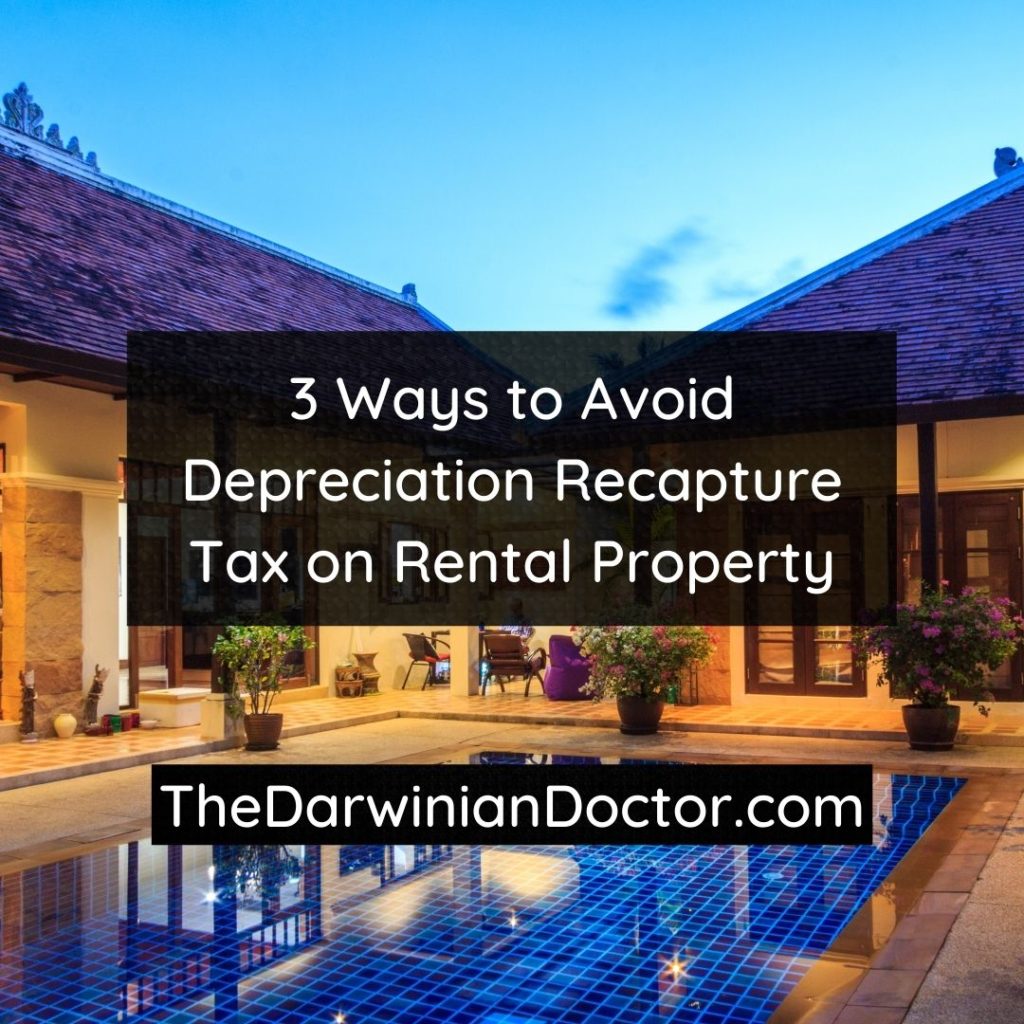One of the best benefits of real estate investing is depreciation, but it creates a growing tax liability issue down the road. This article will go over the three options you have to avoid depreciation recapture tax:
- Sell your property at a loss
- A 1031 Exchange
- Keep your property until you die
This post below should give you a good understanding of depreciation, how it affects rental real estate, and how to mitigate the downsides that come along with this blessing.

This post may contain affiliate links.
One of the best tax deductions for real estate investors is depreciation. This is what I call the “stuff wears out” deduction and it’s one of the reasons why rental properties are inherently tax efficient. Let’s first explain the concept of depreciation. Next, I’ll explain how it affects something called the “basis” in your rental property. After that, I’ll explain how the IRS hits you with something called “depreciation recapture” when you sell your property, and three ways to hopefully avoid this unpleasant experience.
Depreciation
As I mentioned above, I think of depreciation as the “stuff wears out” deduction. It applies to all sorts of business property, from cars to tractors. But as it applies to real estate, it is basically the IRS acknowledging that your property will wear out after some period of useful life has been exhausted.
For example, the roof in a home might last 20 years and flooring might last 10 years before it’s time for them to be replaced. If you think about your home, I bet something breaks or wears down every year. In our case, it’s often plumbing related, but it could just as well be the windows, doors, or the paint job.
However, it is important to note that depreciation doesn’t generally apply to your primary residence. It’s a tax deduction specifically for businesses, like commercial or residential rental property.
Also, another important point is that only the physical structure of rental property is depreciable. The value of the land is not depreciable. This makes sense, since land doesn’t wear out (unless you’re a farmer).
The depreciation deduction is most often used by rental property owners to directly offset the tax implications of rental income.
Advanced tax plays with accelerated depreciation
Before we move on, I should also mention that depreciation plays a central role in some advanced tax planning strategies with real estate investing. I’ve talked about this before in this article on short term real estate investing. In that article, I discuss how you can combine depreciation with a cost segregation to claim 15 years of depreciation in the first year of owning your rental property. This can generate an enormous “paper loss” on your taxes, which could in some situations even lead to a deduction against your overall income. This is called “accelerated depreciation” and is a repeatable strategy that can greatly accelerate your portfolio growth.
This is special use of depreciation is called “bonus depreciation” and allows 100% accelerated depreciation through 2022, then starts to decrease every year thereafter.
Normal depreciation rates
Aside from accelerated depreciation, the IRS has different depreciation rates that depend on what is being depreciated. The rate that applies to residential real estate is different from the rate for commercial real estate.
Depreciation timelines
- Residential: 27.5 years
- Commercial: 39 years
Reference: Internal Revenue Service Publication “How to depreciate property“
Now you might be tempted to just take the appraised value of your rental property and divide it by 27.5 years to calculate your rental property depreciation for the year. You’d be incorrect to do so, because it’s actually based on something called your “tax basis.” Also, depreciation only applies to the building, not the land, so you have to remove the land value from the calculation as well.
Tax/cost basis
Your eyes might start to glaze over at this point, but I’m going to this level of complexity because it’s central to understanding how depreciation recapture rules become a problem on the sale of a property.
According to the IRS, your “tax basis” is your cost to acquire a property. When it comes to real estate, your tax basis is generally the purchase price minus depreciation. It doesn’t matter if you bought the property outright with cash or used a loan. Your tax basis is the same in either scenario.
Major improvements to your property will increase your cost basis, while general maintenance is usually excluded from this calculation.
Importantly, it’s not inflation adjusted. And make note of the “minus depreciation” part. This is the crux of the problem.
The problem with depreciation
I’m a raving fan of real estate investment with rental real estate because you can use depreciation to offset your taxable income that you get from rent checks. This is completely legal and makes rental real estate inherently tax efficient.
But there’s a downside to every benefit. In this case, when it comes to depreciation, the IRS will try to “recapture” this money in the event of a sale of the property.
So when you sell your rental home many years down the road, you may have a nasty shock. Inflation will generally increase the property value of your investment, so you’re usually looking at some level of long-term capital gains taxes when you sell a rental. But depreciation recapture will often increase the capital gains taxes because it’s decreased your cost basis in the property!
Let’s use a simplified example to illustrate this issue.
An example of depreciation recapture in action
Jill is a big fan of my blog and therefore decides to purchase a duplex in Indianapolis for $300,000 in 2022. Let’s say this duplex is in great shape and it needs no upfront renovations. She does some general maintenance over the next 10 years but is lucky and the building doesn’t require major renovation or improvements. In 2032, the property has doubled in value to $600,000. The city assessor says the land is worth $100,000 and the “improvements,” or the building, is worth $500,000.
Jill decides to downsize her rental portfolio and decides to sell the duplex on the open market. She is in the highest tax bracket, so as part of a married couple, she plans to pay 20% tax. This is the maximum capital gains rate in 2022 (and let’s imagine this is the same in 2032).
Jill is thinking her capital gains will be calculated on the sales price minus the original purchase price. She’s thinking roughly $300,000 * 20% = $60k of capital gains taxes.
But she’s forgetting about the 10 years of depreciation that the IRS has been tallying up every year on her behalf. As a residential rental property owner, she’s been claiming a depreciation deduction of 1/27.5 of the original cost basis every year. Because of this, she will actually owe much more taxes than this upon the sale of her property.
The damage:
- $300,000 -$100,000/ 27.5 years = $7,273 annual depreciation
- $7,273 x 10 years = $72,727 total depreciation
- Adjusted cost basis = $300,000 – 72,727= $227,273
- Adjusted profit on sale of the property = $600,000 – $227,273 = $372,727
This $372,727 of gain is broken down into two buckets:
- Long term capital gains = $300,000
- Depreciation = $72,727
These buckets are taxed differently. The long term capital gains is based on the income bracket of the seller. As she is in the highest income bracket, Jill will be charged 20% on the $300,000 = $60,000.
The depreciation is subject to the depreciation recapture tax, which falls under Section 1250 and is capped at 25% since 2019. This represents an additional $18,182.
To make matters, worse, she’ll likely face the Net Investment Income Tax, which is a 3.8% tax on the whole amount of gain (since her income exceeds $200,000 or $250,000 if married). This is an additional $14,164 (3.8% of $372,727).
So with the Net Investment Income Tax and the Depreciation Recapture Tax, Jill owes $32,346 more than she expected.
Her full tax burden on the sale will be around $92,346.
Special thanks to Pat B and Jen for alerting me to errors in my initial version of this! The more I read on this topic, the more I realize that this is a very complex matter. I believe I’ve hit the main points here, but CPAs should feel free to chime in below if I missed something else!
A summary of the issue
Here is a quick summary of what we’ve discussed:
Depreciation deductions are a mandatory deduction given by the government to anyone who owns investment property. As a real estate investor, this means that even if you don’t claim this deduction on your tax return in April, the IRS will take the deduction into account when you go to sell your property. (So you might as well take this deduction and use it to offset your rental income.)
But everything has a catch, and depreciation is no exception. If you sell your property, the IRS will sum up all the depreciation over your ownership period and use it to decrease your taxable cost basis. This will increase the taxes incurred on the sale of your property.
One additional tax is called depreciation recapture tax and is the price real estate investors pay for years of tax deductions.
3 Options to avoid depreciation recapture tax
The good news is that there are a few ways to avoid this sneaky tax on your rental property. Here they are:
- Sell your property at a loss
- A 1031 Exchange
- Keep your property until you die
Let’s go over these options one by one.
Sell your property at a loss
One way to avoid depreciation recapture on your rental property is to sell it at a loss. If there’s no gains, there’s no taxes!
Let’s take Jill from the above example. If she decides to sell her rental property for $190,909, she will have no financial gain from the sale. (And therefore no taxes!)
But unless she’s selling the property to a family member, it makes no sense why she’d give up potential profit just to avoid this tax. While $18,182 of depreciation recapture tax is a painful extra bill, she’s potentially giving up hundreds of thousands of dollars of profit just to avoid this relatively small amount of taxes.
And even if she is selling at a loss as a favor to her family member, it’s important to keep in mind that this is considered a “gift of equity” to her family. She’d be required to report this to the IRS. Later on, this gift will be considered when calculating the estate tax on her assets after death. In my opinion, this last concern is not a huge deal because (from 2022-2025) the estate tax exemption is over $12 million.
But in general, I don’t think it’s a good idea to intentionally sell your property at a loss to avoid the depreciation recapture tax.
1031 Exchange
The “1031 Exchange” is a beloved strategy by real estate investors, and refers to internal revenue code section 1031. It basically allows you to swap your real estate for a different investment. This swap allows for deferral of capital gains taxes. The old and new properties have to be similar so it can be considered a “like kind exchange.” Since this transaction is a trade (not a sale), there are technically no capital gains to be taxed.
There are costs, stressful timelines and specific rules involved in a 1031 Exchange. Despite this, it remains one of the best ways to avoid both capital gains and the depreciation recapture tax.
The downside of the 1031 Exchange is that you don’t get the cash payout from the sale of your property. So if you’re strapped for cash, you might elect to just sell the property and deal with the taxes later.
Until I write up an explanation, please see this good summary from Investopedia about the 1031 exchange for more information.
Keep your property until you die
The final option is to never sell the property. In our tax code, we have something called a “step up in basis” that occurs at the time of your death.
Whether it’s rental property or stocks, the cost basis of your investment will be recalculated to fair market value when you die. This allows you to pass on wealth without saddling your children with large tax bill when they inherit your estate.
This provision has been threatened at various times by presidents and tax bills, but so far is withstanding these challenges.
This is my favorite option, but I readily admit that it’s not alway possible to delay the sale of a rental property until death. In fact, I recently sold my first rental property. Due to an untimely failure of the septic tank, I ended up eating a $3000 loss on the sale. (But I’m still glad that it’s out of my portfolio!)
Read more: Selling My First Rental Property for a Loss | Building the Empire
Conclusion
This was a lengthy article! But now I hope you now understand depreciation, the depreciation recapture tax, and three strategies to avoid this tax.
There’s no such thing as a free lunch. When it comes to depreciation, there is an inherent cost to this benefit. However, through some foresight and education, you can legally avoid depreciation recapture tax completely!
–TDD
Do you enjoy getting into the weeds of real estate taxes? I cover a wide variety of topics here on the blog ,from personal finance to real estate investing and financial independence. So sign up to the newsletter below!
Perhaps you’re more of a Facebook type?
Are you a physician, spouse, or professional and you’re interested in using Real Estate to gain financial freedom? Join us in our Facebook group and accelerate your journey!


Want to support the blog?
- Join our investor club at Cereus Real Estate
- Visit my Recommendations page
- Check out my wife’s food blog: Eat Dessert First
- Stay at our luxury short term rentals
- Check out my TikTok channel
- Follow me on Instagram
- Follow me on YouTube
- Contact me with questions







11 comments
Great article, sorry to hear about the sale of your first property but it sounds like you are on to bigger and better things. I recently had a buyer interested in a vacation rental I own and in speaking with my accountant he suggested the IRS taxes recaptured depreciation at a straight 25%. I’d be interested in hearing from others experience in taxation on actual depreciation recapture.
Hey Pat, thanks for posting this! After some more sleuthing, I think you’re right! There may also be an extra 3.8% tax I didn’t mention. I’ll update the article now.
I believe the 3.8% EIT (earned income tax) applies to gains over $250,000 and if you actively managed the property it doesn’t apply. I’m not sure how having a property manager impacts that.
Small clarification…..the amount depreciated is not the purchase price divided by 27.5, it’s the portion of the purchase price that represents the value of the house (not the land). So if the land on the $300,000 house is worth $100,000, you only depreciate $7,272 annually ($200,000 divided by 27.5).
Great point! I’ve updated the text and crunched the numbers again. Whew, this is complicated. Thank you!
[…] 3 Ways to Avoid Depreciation Recapture Tax on Rental Property […]
What about donating the property to charity if you already give to charity regardless? I believe there’s ways to do it through a donor advised fund
That’s also a consideration! I didn’t think about that. Interesting option.
[…] Read the post on the Darwinian Doctor blog: 3 Ways to Avoid Depreciation Recapture Tax on Rental Property […]
Thank u so much for explaining this very clearly!
Your breakdown of the concept of depreciation and how it affects real estate investments is truly enlightening. The way you’ve explained the potential tax liabilities down the road and then outlined three options to avoid depreciation recapture tax is incredibly helpful. It’s rare to find such a clear and concise resource that not only educates on the matter but also provides actionable solutions. I really appreciate the way you’ve simplified complex tax jargon and made it accessible to your readers. Your dedication to shedding light on this topic is commendable, and I can’t thank you enough for sharing this invaluable knowledge.